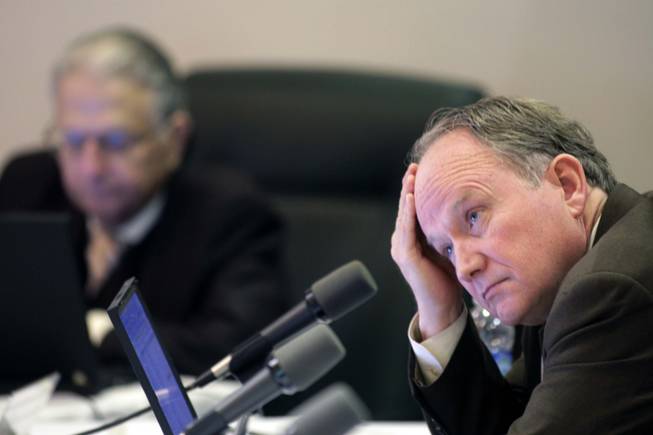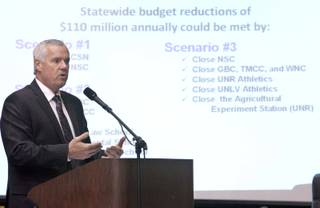
Regent Michael Wixom, right, listens to budget-cutting options during a Board of Regents meeting Tuesday at the College of Southern Nevada.
Wednesday, Feb. 3, 2010 | 2 a.m.
Sun Coverage
Sun Archives
- Chancellor: Budget cuts would undo ‘decade of significant progress’ (2-2-10)
- Higher education faces greatest financial state of emergency in decades (2-2-10)
- With state cuts, how long can teacher salaries be spared? (1-26-10)
- Gibbons to call special session, lawmakers plan public meetings (1-25-10)
- New economic reality: Pessimism (1-23-10)
- State budget comes up $800 million short (1-22-10)
- Forecast: Economy will begin to rebound in mid-2011 (1-22-10)
- Gibbons’ no-talk order further divides branches (1-22-10)
- Special session may require help of state Supreme Court (1-10-10)
- College students band together, rally against budget cuts (1-22-2009)
- Chancellor calls Nevada schools a ‘disaster’ (1-22-2009)
- UNLV fundraising campaign falls short, so deadline extended (12-18-2008)
- Emotional farewells at Regent’s meeting (12-5-2008)
- Rogers to budget cut protestors: Glad you’re here (12-4-2008)
- Fee hikes may become too steep to endure (12-4-2008)
- UNLV fundraisers fighting to the finish (9-1-2008)
- With that pay, no way, many would-be graduate students tell UNLV (5-11-2008)
- Some say setting fees every two years gives universities a blank check (2-16-2008)
Beyond the Sun
This is how bad the news is getting for Nevada’s already-pummeled higher education system.
To absorb an immediate reduction in state funding of $37 million and the loss of another $110 million in the next fiscal year, the Nevada System of Higher Education Board of Regents on Tuesday was presented with an almost unfathomable choice of options.
Some were so extreme as to not be likely, but illustrate the size of the budget hole:
• Close Nevada State College and the College of Southern Nevada.
• Close the Boyd School of Law, UNR's School of Medicine, UNLV’s dental school, the Desert Research Institute, Great Basin College and Truckee Meadows Community College.
• Eliminate UNR and UNLV athletics and the Agricultural Experiment Station at UNR and close Nevada State College, Great Basin College, Truckee Meadows Community College and Western Nevada College.
More realistically, but still extreme, are these money-saving scenarios:
• Cut everyone’s pay, systemwide, by 20 percent.
• Force all employees to take off another five days per month without pay.
• Lay off 1,290 employees and decrease enrollment by 15,570 students, a 14 percent drop from 2009 enrollment.
The staggering options stem from the latest estimates of how much money is coming to the state — it’s still dropping — and how higher education can shoulder its share of cutbacks.
Chancellor Don Klaich told regents the options represent an “unwinding of almost a decade of significant progress in higher education.”
“Make no mistake,” he said. “Higher education in Nevada is changing, and not for the better.
“We will lose our competitive edge ... and add to the already crushing burden of unemployment in this state,” Klaich said. “We will lose the ability to train the workforce for the very economy we wish to attract to this state.”
Klaich said he has met with presidents of the colleges and universities this winter and has been encouraging them to prepare reports outlining the effect of budget cuts of 8 percent, which was what was considered a reasonable estimate at the time of what the governor would be asking of higher ed.
But then the Economic Forum met Jan. 22 and concluded that the state was hurting even more. “I think our collective breath was taken away, and our planning to date became moot on that terrible Friday afternoon,” Klaich told the regents.
At the regents meeting — which drew such a large audience at the College of Southern Nevada’s West Charleston campus that an overflow room was used — the board weighed the prospect of declaring a financial exigency, meaning there’s not enough money to meet expenditures. Doing so would give individual college and university presidents more leeway in cutting staff and programs.
The regents can only vote on such action after a recommendation from the chancellor with input from the council of campus presidents. Klaich said although it’s important for the regents to be aware of the size of the financial crisis, and the possible responses, a decision can wait until the March meeting, after lawmakers have met in a special session and higher ed’s funding levels are more clear.
UNR President Milton Glick said to his knowledge Nevada would be the first higher education system in the nation to be forced to take such drastic measures and would become the case study for fiscal failure in academia.
“We would be the poster child,” Glick said. “That’s a terrible burden.”
CSN is feeling the effects of budget cuts in ways big and small — with forced days off, crowded classrooms, added work assignments and, in student Maria Carrillo’s Astronomy 101 class, reliance on an overhead projector because there’s not enough money for class handouts.
Of more concern to her, Carrillo said, is the prospect of fewer classroom seats. “It’s going to get more competitive,” said Carrillo, who wants to study criminal justice and become a prosecutor. “We’re not only going to have to compete against other people who want to go to college, we’re going to compete against the students who are already here and are trying to stay.”
Editor’s note: this story was modified to clarify the budget-cutting options.
CORRECTION: This story was changed to correct that the School of Medicine is at UNR. | (February 3, 2010)


Join the Discussion:
Check this out for a full explanation of our conversion to the LiveFyre commenting system and instructions on how to sign up for an account.
Full comments policy